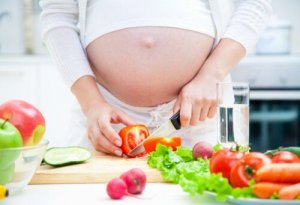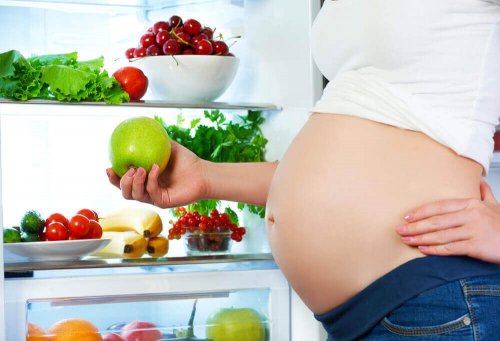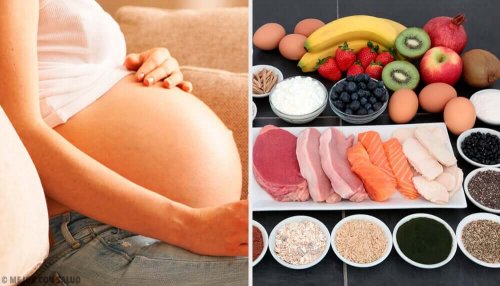The Importance of Diet in Pregnancy

Diet in pregnancy is a crucial factor to ensure both mother and baby enjoy good health. A normal diet isn’t enough to meet pregnancy needs and a lack or excess of food leads to many problems.
Although there are many myths, the fact is that diet in pregnancy is one of the basic pillars for:
- Meeting the nutritional needs of the fetus
- Meeting the requirements of the maternal organism
- Breast milk synthesis during pregnancy
There’s no need to eat for two, as the saying goes. Instead, you need to make good decisions regarding both the quantity and quality of the nutrients you eat. Diet in pregnancy should respond to the new biological balance imposed by the fact that the pregnant woman is creating a new life.
The importance of diet in pregnancy

Diet in pregnancy is related to the health of the baby, both inside the womb and after birth. Poor nutrition during this stage can lead to, for example, preterm labor or low birth weight.
Good nutrition not only has an impact on proper fetal development but also affects the quality of the placenta. Also, it allows you to maintain a good level of energy for both childbirth and postpartum, activates breast milk production, and prevents anemia.
Meanwhile, maternal obesity is associated with an increased risk of developing high blood pressure, liver diseases, or gestational diabetes, as well as the need for a Caesarean section. The children of obese mothers are more likely to suffer from large for gestational age (high prenatal growth rate) and chronic non-communicable diseases (NCDs).
The situation of every mother is different. Thus, it’s important for each one to consult her doctor about her specific nutritional needs. Ideally, the prescribed diet should suit the food tastes and access possibilities of every pregnant woman.
Keep reading: What to Eat When You are Pregnant
Essential nutrients

Generally speaking, diet in pregnancy should follow this ratio:
- Between 15 and 17% should correspond to proteins
- Carbohydrates must represent 53% of the pregnant woman’s diet
- Fats should correspond to 30%
- Pregnant women should take vitamins and minerals in small amounts
Thus, the essential nutrients comprise:
- Carbohydrates. They basically provide energy. They’re in foods such as rice, pasta, whole grains, legumes, potatoes, and fruit.
- Protein. They greatly influence the development of the baby and their birth weight. Also, they aid the growth of maternal organs, such as the uterus and breasts. Medical professionals recommend consuming 80 grams (3 oz) of protein in the first trimester of pregnancy, 100 grams (4 oz) until delivery, and 120 grams (5 oz) during lactation.
- Fats. Good fats protect the body, transport vitamins, contribute to the formation of hormones, and are a source of energy. In this regard, it’s recommended to consume a lot of unsaturated fats and small amounts of saturated fats.
Find out more here: Eat These Foods to Raise Your Levels of Iron
Other essential nutrients
In addition to essential nutrients, other foods are essential during pregnancy and basically correspond to minerals and vitamins. They’re the following:
- Calcium. Pregnant women should consume at least 120 grams (5 oz) of calcium a day. Four servings a day of foods such as milk, yogurt, cheese, or cottage cheese are enough to meet these needs. In addition, you can find calcium in whole grains, legumes, and green vegetables.
- Iron. It isn’t as necessary in the first trimester of pregnancy, but it’s quite important from then on. Pregnant women should consume it daily to prevent anemia and low birth weight. The doctor will determine if a supplement is necessary.
- Other minerals. Medical professionals recommend eating foods that contain phosphorus for proper fetal bone development. Also, they recommend potassium and zinc to protect and promote nervous system development.
- Vitamins. Diet in pregnancy should include foods rich in vitamin A, B vitamins, vitamin C, and vitamin D. All these vitamins contribute to the development of different organs and functions in the baby’s body and maintain the biological balance in the mother’s body.
All cited sources were thoroughly reviewed by our team to ensure their quality, reliability, currency, and validity. The bibliography of this article was considered reliable and of academic or scientific accuracy.
- Mousa A., Naqash A., Lim S., Macronutrient and micronutrient intake during pregnancy: an overview of recent evidence. Nutrients, 2019.
- Miles EA., Calder PC., Can early omega 3 fatty acid exposure reduce risk of childooh allergic disease? Nutrients, 2017.
This text is provided for informational purposes only and does not replace consultation with a professional. If in doubt, consult your specialist.








